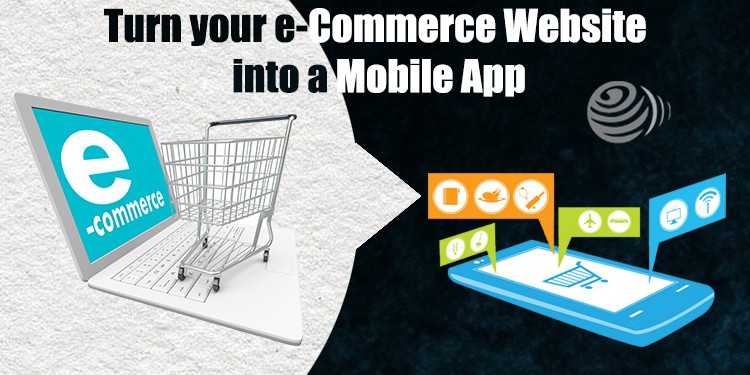Since a long time now eCommerce websites had been reining the world of technology; however that has changed to quite some extent considering the prominence enjoyed by the mobile app. Today you can easily noticed more internet traffic on a mobile device as compared to on a mobile eCommerce app. With the help of numerous tools found in the market it becomes easy to swiftly and easily transition your website into an app.
Meanwhile, as we start it’s necessary to understand that in actual it’s not the transition of a website to an app, on the contrary your app and website will become extensions of one another, thus the website is always there. As per the digital market perspective, it’s vital to have both an app as well as a website as this encourages customer engagement and brand loyalty. At the same time it will help you appear higher on a Google search.
Through a mobile eCommerce app it’s easy to offer high value to your customers following a simple and logical way that helps in accessing the products offered by your business. However, that’s just not an easy thing to do still there are three essential types of mobile app development methods:
a) Native
b) HTML5/Web
c) Hybrid
1. Native
Enjoying great reputation, native apps are designed for particular platforms (usually Android or iOS) offering the best UI/UX and the most features. It’s owing to the fact that native apps are written with the same code as the device’s OS offers clear communication and enhanced operability.
Various benefits:
• Integration
Integration of native apps with a device is quite easy and so is accessing address books, browsers, phone and camera with a native app.
• Performance
High performing apps work best as a native app. It’s particularly significant in case of an eCommerce app. You may not be running numerous animations still your app will require to process lots of data and refresh swiftly.
• UI
The main attribute of native apps is the efficiency to use various kinds of touch gestures, such as swiping, pinching and multi-tapping.
Downsides:
• Lower Search Engine presence:
Native apps doesn’t have the searchable feature as good as HTML5/web apps. This is why businesses relying on search engine traffic (like eCommerce site) suffer a lot.
• Single platform:
You need to develop native apps for each platform and this demands twofold time and money to ensure project completion. This way, entrepreneurs on a tight budget are certain to have a setback.
2. HTML5/Web-Based
Owing to their similarity to website coding HTML5 apps are not always liked. Mainly an HTML5 app is a series of websites presented on your phone. Web-based apps are actually different from native apps and they are a one-size fits all approach. This is why they are way cheaper, both in regard of money and time.
A HTML5 app has a higher search engine presence and it’s expected to grab more traffic. However, the problem is that HTML5 apps lack features and there are issues with animated features. However, it must be noted that the recent advances in UI frameworks have enhanced the UI/UX of a web-based app. At the same time, advancement in CSS3 coding for browsers has enhanced the animation processing.
Meanwhile, the significant feature of a HTML5 app is Free Distribution. While Native and Hybrid apps are circulated over one app store or another, HTML5 apps are constrained just by an internet connection.
3. Hybrid
Entrepreneurs who are on a tight budget must go with a hybrid app that’s mostly written in Java and HTML5, like a Web-based app. However, as it is set inside a native container, this enables users to enjoy the great features offered by a Native app. With the container you don’t get the identical look and feel of a Native app.
You can store a hybrid app on either a secure file storage (such as Native app) or a Shared SQL (HTML5 apps). Now it has certain good features and prices are reasonable too, so what is that you need to be cautious of.
• Not having access to various devices features such as phones, calendars, address books, etc.
• Slow performance than a Native app, but faster than a HTML5 app.
Now ultimately it’s all about the budget and if that doesn’t concern you then a Native app is best to go with. However, lest you are just starting then HTML5 app is advised. Mostly, a Hybrid app has striking features offering best opportunity for success.














